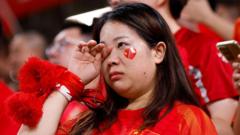China's pursuit of football greatness has faced crippling challenges, from disappointing defeats to rampant corruption within its ranks. A recent landmark 7-0 loss to Japan and a string of scandals have left the nation, burdened by a top-down governance approach, questioning its path to a brighter future in football.
China's Football Aspirations Diminish: A Tale of Woe

China's Football Aspirations Diminish: A Tale of Woe
The rise and fall of China’s football dreams as corruption and poor performance plague the sport.
In a trying series of events that have culminated in the waning hopes of China's footballing aspirations, the national team faced yet another humiliation on a scorching night in Saitama. A 7-0 drubbing at the hands of their long-time rivals, Japan, marked a historic low for the team. With a minute left in the match, Japanese player Takefusa Kubo sealed the woeful fate of the Chinese side by netting the seventh goal, leading to what has been described as "rock-bottom" by local media, following a series of disheartening losses to teams like Oman and Uzbekistan.
As if the humiliation on the pitch wasn’t enough, the situation worsened soon after with the arrest of numerous players, coaches, and officials involved in corruption, gambling, and match-fixing. Shortly thereafter, the men's team suffered yet another defeat, this time succumbing to Australia, solidifying their position at the bottom of their World Cup qualifying group.
For a country blessed with a vast population and the financial means, China's ambitions to become a footballing powerhouse seemed plausible when President Xi Jinping, an ardent football fan, expressed his desire for the nation to qualify for the World Cup and eventually host and win it. However, a decade into his vision, the optimism has faded as even Xi appeared to concede a lack of faith in the team's trajectory when jokingly calling a recent win against Thailand a piece of luck.
Mark Dreyer, a Beijing-based sports writer, pointed out that while the Chinese government has successfully pushed various sectors, football has struggled under the weight of political control. His assessment aligns with a pivotal report that advocated for "legal autonomy" for the Chinese Football Association (CFA), which remains tightly controlled by the Communist Party. The political appointments in football have halted grassroots development, leading to a decaying structure where top-heavy decision-making undermines the foundational growth required for success.
As indicated by the contrasting examples of successful football nations that developed organically at grassroots levels, China's approach has produced a warped structure incapable of fostering real talent. The stark statistics illustrate this disparity: England boasts 1.3 million registered players while China struggles to reach even 100,000. Observers note that the lack of childhood exposure to the game results in lesser creative instincts and tactical decisions among young players.
Despite the abject failure of the men's team, the women's squad has emerged as a source of National pride, ranked 17th globally, attracting significant viewership during the World Cup. Yet, operational challenges continue to hinder professional clubs post-pandemic, with over 40 folding due to investment withdrawal, exemplifying systemic volatility in the sport.
The shadows of corruption, plainly depicted in a documentary featuring confessions from former manager Li Tie regarding match-fixing and bribery, have cast a dark veil over the sport. Li's penitential admission and consequential imprisonment reflect a deep-rooted issue that has pervaded Chinese football for years.
As China's economy navigates a downturn, the nation faces pressing challenges far beyond football. Still, fervent supporters of the sport yearn for a brighter horizon. In contrasting their circumstances with Japan's success, fans express both disappointment and humor over their team's consistently poor performances, hoping for a future where football in China thrives beyond the realms of politics and corruption. The struggle for China’s footballing legitimacy remains an ongoing saga, raising the fundamental question—can football flourish in an environment dominated by top-down authority?




















